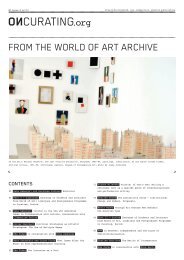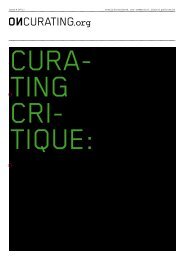Create successful ePaper yourself
Turn your PDF publications into a flip-book with our unique Google optimized e-Paper software.
087 Issue # 11/11 : PublIc Issues<br />
time to work together and to disagree. Spending time together seems<br />
to be quite simple but over the course of my practice I have learned how<br />
difficult it is.<br />
In 2008, you developed the project shanghai Dreaming, Holding<br />
an urban Gold card within the 7th shanghai biennale. What did you know<br />
about the notion of the public sphere in china?<br />
In 1985, I w<strong>as</strong> an exchange student at Sichuan Fine Arts Institute in<br />
Chongqing. Since then, I have closely followed China's developments, its<br />
rapid economic growth, and its urban politics in the news, academic<br />
studies, and on blogs. When I arrived back in Shanghai for preparation<br />
for the Biennale, after an absence of more than 20 years, nothing could<br />
have prepared me for the shock of experiencing the proactive way the<br />
Chinese state welcomed and embraced economic globalisation <strong>as</strong> a golden<br />
opportunity for China to modernise itself. I decided to take that<br />
be-wilderment <strong>as</strong> a starting point to work with. While construction is<br />
ongoing everywhere, filling every possible space in the city, every few<br />
minutes new businesses are being set up on every street, selling food,<br />
toys and T-shirts, collecting recyclable paper, cans, wood and textiles<br />
by migrant workers streaming in from the countryside in search of a<br />
better life. (fig. 5) Vendors operating without license form an incre<strong>as</strong>ingly<br />
dense web of informalities that serves the entire city and by that<br />
defines its public face. I found it intriguing that the combined free<br />
enterprise of this temporary population, which is granted only restricted<br />
citizenship, should be the city's shaping force. So I went looking<br />
for ways in which the dreams of fortune arising from migrant workers'<br />
personal initiatives inform a new shared language of change.<br />
How did the project shanghai Dreaming, Holding an urban Gold card<br />
respond to this experience?<br />
To show this language of change, we chose to work with T-shirts, <strong>as</strong> they<br />
are used a lot on the streets of Shanghai <strong>as</strong> a means of expressing<br />
different viewpoints in public. (fig. 6) This w<strong>as</strong> one of the re<strong>as</strong>ons for<br />
the government to ban T-shirts bearing slogans from the stadium during<br />
the Olympic Games. We worked with a young couple that normally organizes<br />
freebee sessions and sample presentations of big brands on the street.<br />
They organized a freebee presentation of T-shirts, for which we registered<br />
a new brand called Fortune. Together with 40 volunteers, they offered<br />
over 2,000 T-shirts to p<strong>as</strong>sers-by saying "you can have this sample of<br />
Fortune but we would like you to put it on straight away." Although this<br />
w<strong>as</strong> merely a small gesture, it turned the "people's square" red in less<br />
than an hour. That w<strong>as</strong> how we byp<strong>as</strong>sed gaining permission to show the<br />
T-shirts on the street, <strong>as</strong> displaying 35 red T-shirts would be considered<br />
a demonstration by the authorities.<br />
5 — shanghai Dreaming, Holding an urban Gold card —<br />
public action, 2008, Shanghai. Photo: Wenying Liao<br />
6 — shanghai Dreaming, Holding an urban Gold<br />
card — installation detail, 2008, Shanghai. Photo:<br />
Wenying Liao


![Download as PDF [10.6 MB]](https://img.yumpu.com/4266533/87/500x640/download-as-pdf-106-mb.jpg)

